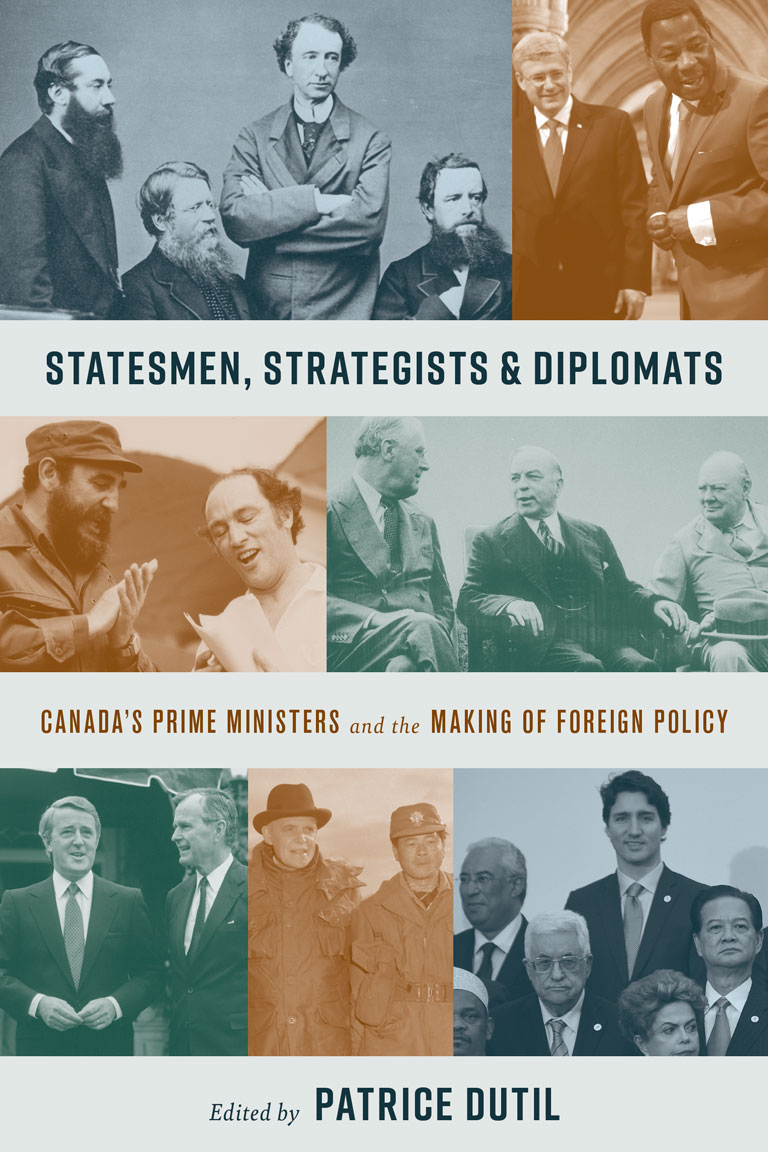Statesmen, Strategists, and Diplomats

Statesmen, Strategists, and Diplomats: Canada’s Prime Ministers and the Making of Foreign Policy
edited by Patrice Dutil
UBC Press
403 pages, $39.95
In international relations, there are two essential questions: Who really has the authority to represent a sovereign country? And can that person deliver on promises — or threats — made to another country?
Time after time, in actual negotiations, governments and multilateral organizations face these questions. More often than we might expect, international undertakings are quietly forgotten or revised because powerful folks back home do not agree with solemn promises that have been made in their names.
An added challenge to the authority of negotiators arises from conflicts between differing economic and social interests within a sovereign state. Think of today’s difficulties in balancing international commitments where hydrocarbon sectors and environmental advocates compete. Who has a view of the entirety of a country’s interests, and who is best able to voice a national position?
To these questions, Patrice Dutil replies unambiguously: It is the prime minister who has the final word for Canada, especially on major dossiers. It is the prime minister who can best see all the demands on a government, deciding on potential trade-offs, communicating choices, and making commitments.
Dutil is a political scientist, but he has the ability to reach non-academic audiences. He is the founding editor of the Literary Review of Canada and the author of numerous studies that skate a fine line separating history and politics. He is, in my view, a hero of cultural expression in this country.
His latest collection of essays is excellent, grouping fourteen contributors, primarily historians or international- relations specialists, who analyze the international dimensions of most of Canada’s prime ministers from John A. Macdonald to Justin Trudeau. Statesmen, Strategists, and Diplomats is a unique book, both for its subject matter and its comparative approach.
With 7 uniquely curated newsletters to choose from, we have something for everyone.
Dutil suggests that we examine each prime minister against three broad criteria: impacts on government structures, policies, and personal styles. This is a reasonable framework, moving us away from a purely descriptive account of a prime minister’s activities. The chapters concludes with short matrices that summarize how that prime minister fared, based on Dutil’s three criteria. It’s an innovative scorecard that aims to answer the question: What did this prime minister actually do on external affairs?
In a similar vein, the book concludes by ranking prime ministers on their foreign-policy performance and their overall legacy. There are clear winners, losers, and middle-range performers. For some historical fun, readers should do their own scoring before reading the academic assessors; for the record, I disagree with the book regarding William Lyon Mackenzie King and Brian Mulroney (I give the former a lower score and the latter a higher rating).
The substance of this fine book is found in the individual chapters on each prime minister, highlighting episodes that general biographies might overlook. For example, Barbara Messamore examines Macdonald’s role in the 1871 Treaty of Washington negotiations, including the vexed issue of American fisheries’ access to Canadian waters. She shows how Macdonald overruled his minister of marine and fisheries, Peter Mitchell, who had initiated aggressive enforcement actions against the Americans. The prime minister sought a bigger fish in the form of a reciprocal trade agreement, but he was also suspicious of the British government, which exercised senior international authority at that time. The prime minister alone was able to find a balance between competing domestic and international interests.
A clear pattern emerges from these essays. First, foreign policies are inevitably tied to domestic considerations, and the domestic is usually dominant. Second, the most successful prime ministers work in close partnership with the ministers responsible for foreign affairs or international trade. This has been especially true in recent years, given the technical complexity of files. The prime minister who hogs the puck will score fewer goals! And third, there is remarkable continuity in the issues that demand Canadian international attention — notably, trade and defence relations with the United States, protection of ocean boundaries and resources, and effective alliances within multilateral frameworks.
One other issue is alluded to but not deeply examined in this volume: our desultory military preparedness. It lurks in the background, taking front stage only when Canada has participated in global wars. Military capacity, together with development aid and legal expertise (especially in trade), are the core tools of international relations. The records and views of Canadian prime ministers in this area are worthy of deeper study.
We hope you’ll help us continue to share fascinating stories about Canada’s past by making a donation to Canada’s History Society today.
We highlight our nation’s diverse past by telling stories that illuminate the people, places, and events that unite us as Canadians, and by making those stories accessible to everyone through our free online content.
We are a registered charity that depends on contributions from readers like you to share inspiring and informative stories with students and citizens of all ages — award-winning stories written by Canada’s top historians, authors, journalists, and history enthusiasts.
Any amount helps, or better yet, start a monthly donation today. Your support makes all the difference. Thank you!
Themes associated with this article
Advertisement
Save as much as 40% off the cover price! 4 issues per year as low as $29.95. Available in print and digital. Tariff-exempt!




